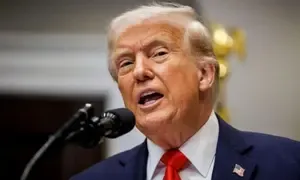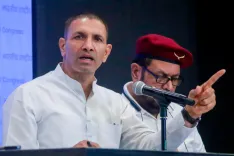Trump Administration Faces Judiciary Standoff with Contempt Threats

Synopsis
Key Takeaways
- Trump administration in dispute with judiciary over deportations.
- Federal judges threaten contempt proceedings for non-compliance.
- Issues arise over migrant deportation policies.
- Challenge to Constitutional separation of powers.
- Potential for significant judicial confrontation.
New York, April 17 (NationPress) President Donald Trump’s administration is currently engaged in a contentious dispute with the judiciary regarding its initiative to deport illegal migrants to El Salvador, who are reportedly affiliated with criminal organizations now classified as foreign terrorist groups.
A federal judge issued a warning on Wednesday, threatening criminal contempt proceedings against the administration for its failure to comply with his directive to return to the US a plane that was transporting Venezuelan migrants to a notorious high-security detention center in El Salvador.
On the previous day, another federal judge informed the Justice Department that she intended to take action against it for not adhering to orders to return a Salvadoran migrant who had been mistakenly deported to El Salvador.
This judge also indicated that contempt proceedings could be initiated against officials.
The warnings from these two judges, in separate cases, aim to curb the administration’s deportation efforts and challenge the Constitution’s division of powers between the executive and judicial branches.
Trump and his team have dismissed the judiciary's threats.
Judge James Boasberg pointed out that there is probable cause to hold the administration in contempt for not allowing the migrants en route to El Salvador to contest their deportation in a US court.
The Justice Department contends that once the planes are airborne, they fall outside the court’s jurisdiction and cannot be recalled.
“The Constitution does not permit willful disregard of judicial orders — particularly by officials of a co-equal branch who have sworn to uphold it,” Boasberg remarked.
The administration, which invoked the Alien Enemies Act for these deportations, has resisted providing details about the migrants, claiming it would jeopardize state secrets.
According to the administration, 238 Venezuelans are affiliated with the dangerous criminal gang Tren de Aragua, which is involved in criminal activities in the US and internationally. Since this gang has been designated a foreign terrorist organization, the administration believes it can act against them under the Alien Enemies Act, a law established in 1798.
Boasberg stated that while the government is not required to bring the migrants back, it must allow them the opportunity to contest their deportation in court.
If this does not occur, he would mandate officials to testify under oath to identify those who defied his order and prosecute whoever is accountable.
When a court holds someone in criminal contempt, the Justice Department takes charge of the prosecution.
If it opts not to prosecute, Boasberg suggested he would appoint an external attorney as the prosecutor.
The Trump administration has announced plans to challenge Boasberg's ruling, potentially taking the case to the Supreme Court, where it had previously achieved a partial victory against him in another issue.
In an appeal, the Supreme Court nullified a temporary order issued by Boasberg that aimed to halt deportations under the Alien Enemies Act, but upheld the rights of individuals facing deportation under this law to contest it in court.
In another matter, Kilmar Abrego Garcia, a Salvadoran man, was mistakenly deported despite a judge's order prohibiting his removal to El Salvador, where he might encounter violence.
Judge Paula Xinis instructed the government to return him.
Upon appeal, the Supreme Court partially supported the judge, directing the government to merely “facilitate” his return, instead of actually bringing him back as Xinis had ordered.
During a White House meeting with Trump, El Salvador’s President Nayib Bukele stated he would not release Garcia from the notorious Centro de Confinamiento del Terrorismo (CECOT) prison, known for housing hardened criminals.
Attorney General Pam Bondi commented that the situation rests with Bukele and that Garcia is “not coming back,” declaring it the “end of story.”
Interpreting the Supreme Court’s directive to “facilitate” Garcia’s return narrowly, Bondi stated that if El Salvador releases him, the US would provide a plane to bring him back.
Though the deportation was acknowledged as a mistake, the government maintains that Garcia is affiliated with MS-13, a notorious gang originating from El Salvador.
Judge Xinis requested the Justice Department to offer regular updates on its actions to facilitate his return, along with information regarding his case.
Frustrated by the administration's lack of comprehensive responses, she remarked, “There will be no tolerance for gamesmanship or grandstanding.”
She has mandated four government officials to appear for a deposition next week alongside Garcia’s attorneys.
The administration's attorney, Dave Ensign, indicated that the government might appeal her decision.
Ultimately, the Supreme Court could have the final say on contempt proceedings, and should they arise, it could lead to a significant confrontation between the Trump administration and the judiciary.
Trump has labeled Boasberg a “radical left lunatic,” and a group of Republican House members has introduced a resolution for his impeachment.










